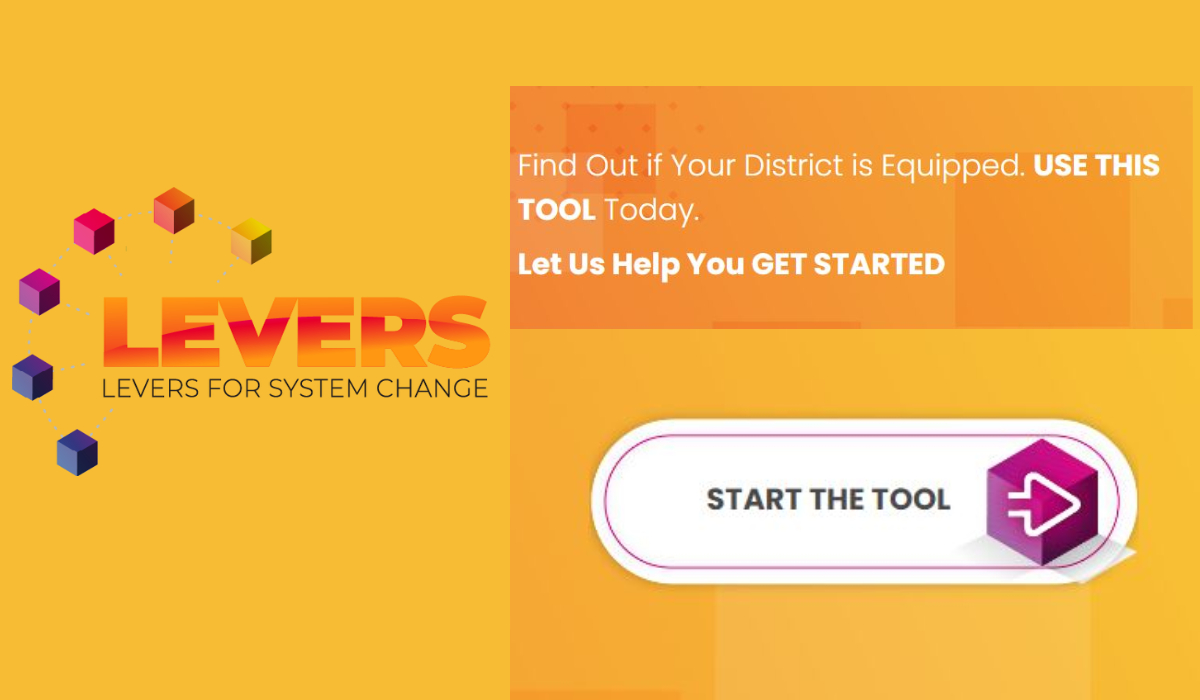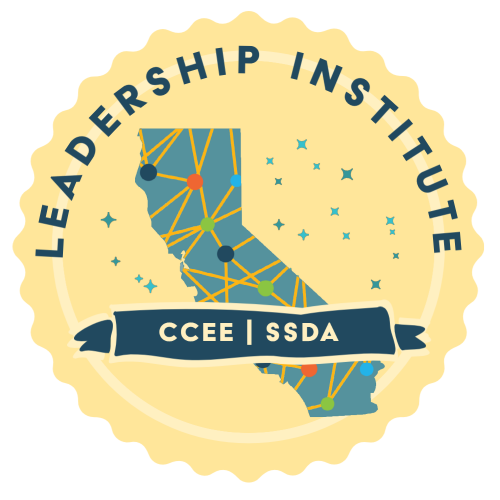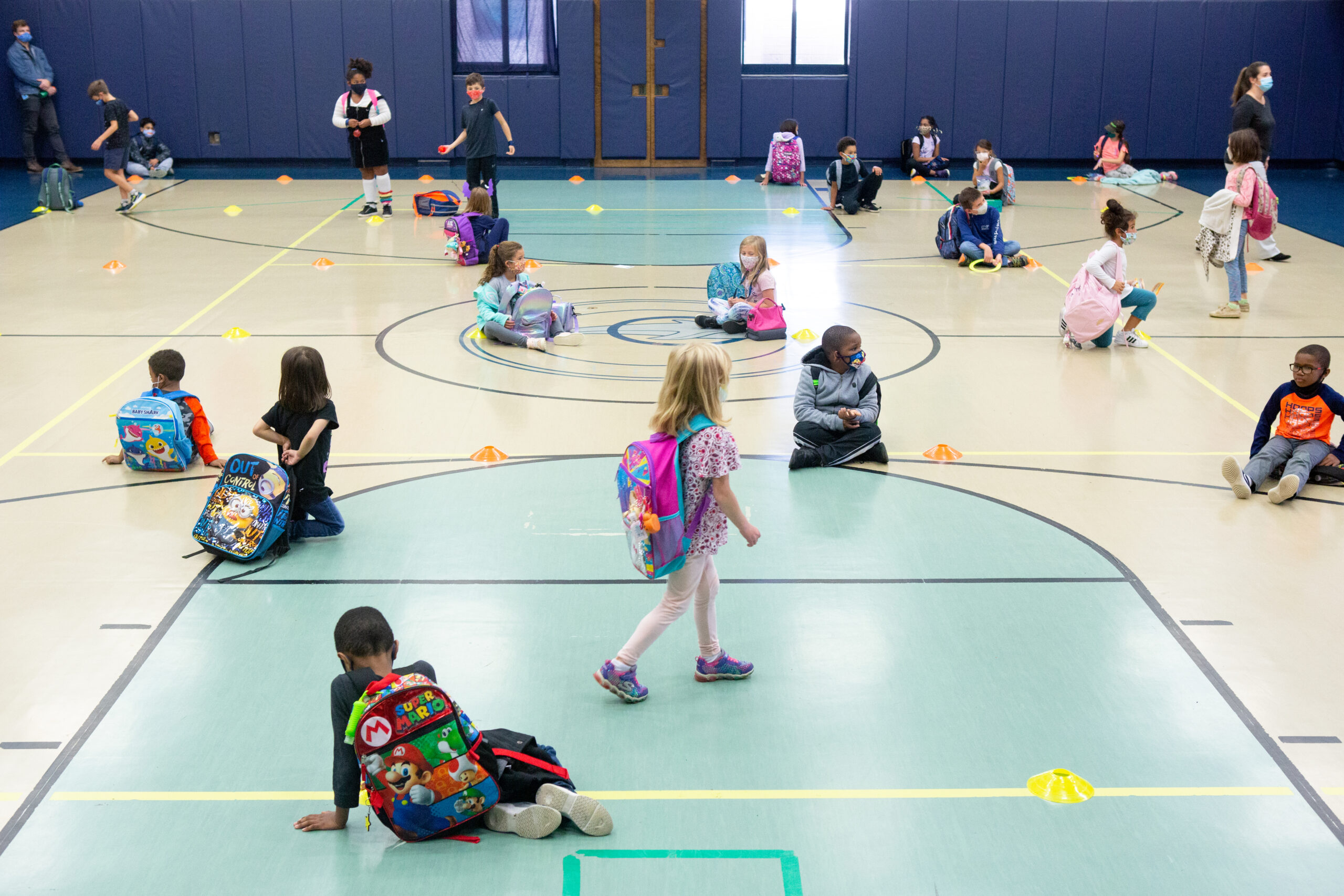Category: NEWS & EVENTS
Friday 5 – Special Education Local Plan Area (SELPA)
REGISTER NOW: FREE CA Small School District Leadership Institute
The California Collaborative for Educational Excellence (CCEE) in partnership with the Small School Districts Association (SSDA) are collaborating on the Leadership Institute. The ultimate goal of the Leadership Institute is to creating networks and support systems for small school district leaders so that they gain the skill set and confidence needed to effectively lead their districts. The LI aims to empower educational leaders in an authentic environment of learning and grace to grow in service to their students, staff, and communities.
Registration for the 2023-24 Leadership Institute is now open and scheduled to start July, 2023.
Areas of focus include:
- Development of clear goals with impact for the Board and the Superintendent
- Alignment and allocation of resources for transformative system improvement
- Recruitment and retention
- Capacity building to sustain and scale
- Create a professional learning network among other small school district leaders
Leadership Team:
- Chris Hartley, Deputy Executive Director, CCEE
- Julie Boesch, Assistant Director, State System of Support, CCEE
- Tim Taylor, Executive Director, SSDA
- Jana Rosborough, Consultant, CCEE
- Melissa Hodgson, Program Specialist, CCEE
Faculty Coaching Team:
- Amy Alzina Cold Springs Elementary School
- Nikol Baker Lake Elementary School District
- Ken Burkhart Alpine County Unified School District
- Liz Bystedt Jamul-Dulzura Union School District
- Todd Cutler Tahoe Unified School District
- Merrill Grant Fall River Joint Unified
- Tom O’Malley Modoc Joint Unified School District
- Stuart Packard Buttonwillow Union School District (retired)
- Jeremy Powell Hamilton Unified School District
- Terri Rufert Sundale Union Elementary School District (retired)
- Heidi Torix Eastern Sierra School District
Leadership Institute 2023-2024

For more information or to join the upcoming Leadership Institute Network, please contact Julie Boesch at jboesch@ccee-ca.org
Friday 5 – Resources from 21st Century California School Leadership Academy
CCEE Connection (June 2023)
News & Announcements
Community Engagement Initiative (CEI) 2.0 Lead Agency RFA Announcement
The California Department of Education has released the results of the CEI 2.0 Lead Agency RFA. You can view the results on the CDE’s website.
In Case You Missed It
System of Support Updates (June 2023)
21CSLA Showcase in Sacramento
Our 21st Century California School Leadership Academy held a showcase in Sacramento on Thursday, May 11 to celebrate the first three years of supporting equity leadership in California! More than 90 people attended from across the state, including our state partners at California Department of Education, State Board of Education, and California Collaborative for Educational Excellence who have invested in and supported this important work. Read more and see photos.
21CSLA Practice Brief: Insights from California’s TK Educators and Leaders
In this practice brief, we underscore four key themes from UTK educational leaders as areas ripe for further research. These findings underscore current pressing challenges and dilemmas facing UTK leaders and speak to the larger context in which UTK expands. We draw from semi-structured interviews with four California UTK leaders to illuminate the challenges, opportunities, and ingenuity of educators and districts in supporting UTK implementation and/or expansion. Link to the brief.
Envisioning and Leading Equitable TK Classrooms
Alameda County Regional Academy in partnership with Alameda County Office of Education will offer UTK Professional Learning Envisioning and Leading Equitable TK Classrooms on August 1 and 2, 2023. Register here: https://bit.ly/41vU6JX
Equity Corner
Reasons to Celebrate in the month of June:
- African-American Music Appreciation Month
- Father’s Day
- Dragon Boat Festival
- Deafblind Awareness Week (starts 27th)
About the Transformative Systems for Equitable Education (TSEE) Center
The TSEE team supports more than 20 unique statewide initiatives. Our Administrative Assistant II, Fiscal Analyst, and Program Specialists are the foundation of our team. They take care of all of our operational, administrative, and project management needs. The TSEE team takes pride in supporting our Deputy Executive Director, Senior Advisors, and Assistant Directors to collectively pave the way through communication, collaboration, and leadership to ensure our impact is far-reaching. While we all support different initiatives, we work together to deliver on our common goal of improving outcomes for all students.
About the CCEE
The California Collaborative for Educational Excellence is a statewide leader delivering on California’s promise of a quality, equitable education for every student.
Executive Director’s Corner
Celebrating Gratitude
By Matt J. Navo, Executive Director, CCEE

“Sometimes it’s helpful to stop and be grateful for what we do. Education in California, one of the largest states in the nation, is complex. It can often make educators feel like we may never get to where we need to be, but I would like to share another perspective. The CCEE is grateful to be part of such an incredible state when it comes to education. Our organization has seen many other state education systems and in our opinion California is often miles ahead in both our approach to and innovation of our education systems.
Our state board and state board staff are incredibly thoughtful and represent a great and diverse group of thinkers, led by one of the most notable researchers in Education, Linda Darling Hammond. Our California Department of Education and the State Superintendent, Tony Thurmond, are visibly traveling and engaging with parents, associations, and educational partners to figure out how best to support them. Our associations, county offices, and state lead agencies are always willing to step up with grace and a willingness to serve.
All these examples remind me that regardless of what we think the current state of education is, we can be grateful for the fact that everyone in this “system” has one thing in common…we all want what is best for our students, teachers and families in California. Gratitude is something we can all benefit from once in a while.
Reflecting on the Year
By Chris Hartley Ed.D. Deputy Executive Director, CCEE

The school year is winding down, summer and planning for the next year is in full speed. It is a natural transition in our system with educators across the state reflecting on the past year, while planning for a new one ahead. During these times it is important to not only find time to enjoy a break for rejuvenation, but to also take a moment and recognize our partnerships and the relentless commitment to serving the students, families and communities throughout the state.
On May 12th the annual “All Leads” meeting took place and was in person for the first time since 2019. The level of expertise, experience, creativity and innovative spirit among attendees was only surpassed by a deep commitment to serving all children and youth in our state. Our teams at CCEE are extremely grateful for the incredible collaboration we have with all our partners and look forward to continually growing and expanding these relationships.
When we organize, collaborate and deliver support together, a true system with minimal silos and thru line from state initiatives to direct district and school site support is magnified. At the end of the day, there are many hands on deck, each embracing positive aspirations for developing and deepening a Statewide System of Support that is cohesive, clear and accessible. My deepest gratitude to our many partners, let’s finish strong!
The Strengthening of the Statewide System of Support
By Mindy Fattig, Senior Advisor, CCEE
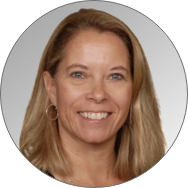
The CA Statewide System of Support (SSOS) provides coordinated, needs-based and differentiated resources and supports to LEAs that lead to improved outcomes for all students. As I reflect upon this past school year, the CA Statewide System of Support is stronger than ever. So much gratitude is given to these 13 lead initiatives and the purposeful integration and leverage of best practices across the state.
Just a few of the many recent examples of the Statewide System of Support working together to improve outcomes for all students include the Geographic Leads continuing their strong partnership with various leads throughout the SSOS including intentional focus and support on integrating differentiated assistance and the special education monitoring processes. The Regional English Language Learner leads partnering with 21CSLA, SELPA English Language lead and Educator Workforce Investment lead for English Language Learners to bring proactive support to our educators and students and all the leads collectively learning from each other and utilizing Universal Design for Learning and Community Engagement strategies so all of our students will have what they need to thrive.
The SELPA leads have worked tirelessly and successfully over the last five years to bring resources and implementation support focusing on improving outcomes for students with disabilities. They have done this through building the capacity of local SELPAs, integration of special education and general education monitoring activities, providing services and supports with COEs and direct support to thousands of families, students, and LEAs across CA. Their impact does not stop there as 93% of the SELPA, COE and LEA educational leaders said that they feel confident in their ability for sustained implementation at the local level on strategies and resources learned through the SELPA leads.
The Geographic Leads, as connectors in the SSOS, have greater coherence and collaboration across statewide initiatives as evidenced by feedback from a County Office administrator, “Working with the Geo Lead has provided me with a better understanding of where support and expertise lies. I have been able to ‘broker’ this and connect our LEAs with professional development and other support from other COEs (work that is beyond the capacity of our own COE).”
At the recent in person “All Leads” meeting in May, when asked what the strengths are of the Statewide System of Support from the educators providing the support to the field, words such as “interagency and cross initiative collaboration”, “increased use of continuous improvement strategies” “ mindset on inclusive practices” resonated over and over again.
As we look forward to the 2023-24 school year and the needs of our students in CA, we are well equipped to provide support in implementation of resources due to the hard work and neverending dedication of our collective common goal of improving outcomes for all of our students in CA. Our statewide system is stronger than we have ever been. As one educator leader summed up, “Our school now uses continuous improvement to help guide initiatives, and show how the initiatives can complement each other as opposed to feeling siloed or in competition with each other.”
Thanks again to all the educators, families, community organizations and to our students. We are collectively the Statewide System of Support. CCEE, working in collaboration with our state agencies partners at CA Dept of Education and the State Board of Education, look forward to continuing to build, refine and ensure the highest quality of education resources, supports and services throughout California.
Gratitude – A Story of Success
By Giovanni H. Annous, Ed.D., Superintendent, Upper Lake Unified School District

It is said that it takes a village to raise a child. For Upper Lake USD, we are blessed to have our whole community working together to create the best possible educational, social, and emotional support system for all our students.
ULUSD’s participation and partnership with the CCEE “Continuous Improvement Model,” and for the last three years in the Community Engagement Initiative (CEI), has allowed us to sharpen the focus of our work and guide us through practices that have fundamentally changed our communication style and content with our stakeholders and the community at large.
Our introduction of the “The Dual Capacity-Building Framework for Family-School Partnerships” and our work with the “Root Cause Analysis” to identify our “Problem of Practice” has been an eye-opening experience. Due to the current work in these areas in concert with our intentional focus on implementing with fidelity, highly effective academic and social programs, ULUSD has become a “Destination District.”
Our “Responsive Leadership” created a culture and structure for system organization learning to include the different voices from our community in the design, development, and implementation of processes, programs, and services. Today our local native Pomo Tribes leadership, philanthropic & service organizations, and business community are partners in shaping our organizational outcomes. This engagement raises the level of responsibility and accountability that we all collectively hold for the success of our students and youth population in general.
We believe that the absence of engagement limits growth and fosters a diminishing mindset. Gratitude for community partnerships moves educational organizations forward.
CEI has been a catalyst on our path to success.
The Leadership Institute Delivers the Secret Sauce
By Amy Alzina, Ed.D., Cold Spring School District Superintendent

Superintendents collaborating on and sharing best practices and strategies is the secret sauce to achieving exceptional results in public education. The Small School Districts Association (SSDA) and the California Collaborative for Educational Excellence (CCEE) have partnered to develop the Leadership Institute, a community of leaders to collaborate, support and mentor new superintendents. The founding principle of the Leadership Institute is to empower educational leaders by providing access to the resources they need for exceptional student achievement. The collaborative approach has resulted in statewide synergy in the field of public education.
Small school district superintendents no longer need to feel isolated. Within the Leadership Institute, participants are matched with a seasoned successful superintendent who serves as a trusted coach and mentor for a period of six months. During this period, best practices are reviewed in the areas of Governance and Fiscal Management, Community Engagement, Vision and Goals, Human Resources and Effective Communication. The purpose is to improve student outcomes and build a positive district culture and climate.
As a coach, I value the time I spend coaching and mentoring my colleagues. We all come to the table with unique strengths and talents. During our time together, we tap into each other’s strengths to share best practices. Often, I gain new knowledge from the stories and experiences shared in the group. I also make myself available to the participants whenever they need my support or simply need a sounding board.
Unlike traditional professional development, this is not designed to add more to the plate of a superintendent. It’s a time to support each other with the resources and knowledge we each possess. Our conversations range from emergency recovery efforts to understanding the reading intervention strategies and programs that make a positive impact on student achievement. We also share many of the state mandated plans and the process used to gather stakeholder input.
The Leadership Institute is a great example of an effective means to bring equity to education. Together, we are opening doors by providing resources that will drive the actions of all Superintendents to be effective for the students they serve.
CCEE and Santa Clara County Office of Education Collaborate on UPK Implementation
By Amanda M. Dickey, Esq., Executive Director of Government Relations, Santa Clara County Office of Education
California policy makers have made historic investments over the last few years to bring the state closer to universal pre-kindergarten (UPK) for all 3- and 4-year-olds. This has come in the form of several new and expanded programs including TK expansion to all 4 year-olds by 2024/25, the Expanded Learning Opportunities Program (ELO-P), an additional 200,000 childcare vouchers, and more than 8,000 additional preschool slots.
As local education agencies (LEAs) work toward implementation of this ambitious goal, many have expressed the need for technical assistance, tools, and training to help them address barriers and shortages in staffing and facilities. Small and rural LEAs are facing some of the most significant implementation challenges due to economy of scale issues. In response, CCEE has partnered with the Santa Clara County Office of Education (SCCOE) over the last year to develop Tier 1 and 2 tools and trainings to add to the statewide system of support. To ensure that these resources support all schools, regardless of size or circumstance, the partnership has collaborated with LEAs throughout the state and with the Department of Education.
Most recently, the CCEE/SCCOE partnership offered a UPK Blending, Braiding and Layering workshop in which LEAs were provided with a series of high-value tools that helped them identify mixed-delivery models to address their staffing, facilities, revenue, and/or cost shortage. These tools are now available online to all LEAs and include: 1) a resource hub with curated, summarized, and searchable resources for busy school administrators, 2) a planning tool to help LEAs project their staffing and facilities needs and identify issues with enrollment and costs, 3) an online technical assistance tool with AI features that provide tailored suggestions for LEAs based on their unique characteristics, and 4) a budgeting worksheet and accompanying costs/revenues template. To access these resources or learn more about how blending, braiding, and layering early learning and care programs can help your LEA address barriers to UPK implementation, please visit visit https://upktool.ccee-ca.org/. To view the workshop slide deck, visit https://docs.google.com/presentation/d/1kn4eHWv3LoOUCx5wFpd5eSwfiChMxGGb/edit#slide=id.p1
Friday 5 – Connecting Minds: Uniting Leaders & Empowering Change through Summer Summits
Independent Evaluation Services Within the Statewide System of Support Initiatives
DESCRIPTION
Established by the Legislature in 2013 with the enactment of the Local Control Funding Formula (“LCFF”), the CCEE became operational in 2015 to “advise and assist” local educational agencies (“LEAs”) with achieving the goals set forth in their Local Accountability Plans (“LCAPs”). (Ed. Code § 52074.) CCEE is an integral part of California’s State System of Support, which is designed to build the capacity of LEAs to support the continuous improvement of pupil performance, address the achievement gaps between pupil subgroups, and improve outreach and collaboration with stakeholders to ensure that LCAPs reflect the needs of pupils and the community, especially for historically underrepresented or low-achieving populations (Ed. Code § 52059), the CCEE’s responsibilities have been updated to support this work.
The CCEE is seeking proposals to secure independent evaluation services for up to four (4) key initiatives led by the California Collaborative for Educational Excellence within the Statewide System of Support:
- System of Support Coordination
- Geographic Leads Initiative
- Special Education Resource Lead Initiatives
- Community Engagement Initiative
A brief description of each of these key initiatives is included in the Request for Proposal. CCEE is requesting services to support external evaluation services to provide both formative and summative evaluations of the activities conducted as a part of four key initiatives.
Due Date for Proposals: June 28, 2023 at 4:00 p.m. PST
REQUEST FOR PROPOSALS (RFP)
QUESTIONS & CLARIFICATIONS
NOTICE OF INTENT TO AWARD
Point of Contact: Mindy Fattig ([email protected])
Last Updated: August 23, 2023
Friday 5 – Resources for Implementing Mental Health Services
CCEE Connection (May 2023)
News & Announcements
Project CLEAR (California Literacy Elevation by Accelerating Reading)
Project CLEAR builds capacity in implementing and accelerating literacy development in districts across the state. Educators can participate in one of two levels of professional learning offered through Project CLEAR – Teacher Leaders and Teachers. Participation is fully funded through Project CLEAR! For more information, see Project CLEAR’s webpage on our Learning Acceleration System Grant Website.
In Case You Missed It
System of Support Updates (May 2023)
New 21CSLA Practice Brief: Insights from California’s TK Educators and Leaders
Drawing from interviews with California UTK leaders, this practice brief underscores key themes from UTK educational leaders as areas ripe for further research. These findings serve to illuminate the challenges, opportunities, and ingenuity of educators and districts in supporting UTK implementation or expansion. Read the brief
May Resources
- Mental Health Awareness Month – NAMI raises awareness and provides support to educate the public on mental health
- Healthy Minds Innovations – an easy to use app as a guide to well-being
- Asian Pacific American Heritage Month – Find ready use lesson plans, student activities, guides, and research aids in this selection of resources for teachers
About the Teaching, Learning, and Leading Center (TLLC)
Our team works in alliance with educators to improve teaching, learning, and leadership so every student is inspired and prepared to thrive as their best self.
About the CCEE
The California Collaborative for Educational Excellence is a statewide leader delivering on California’s promise of a quality, equitable education for every student.
Executive Director’s Corner
Wellness in Education
By Matt J. Navo, Executive Director, CCEE

What do we mean by wellness in education? For us it means a myriad of support needed to address Social Emotional Learning (SEL), mental health, and well-being of students. If we can see how SEL strategies and practices impact the mental health and well-being of students, then it would allow educational practitioners to be more focused on how to utilize funding to support the wellness of students and educators. Measuring the impact of those supports and services as it relates to the education of the whole child requires an intentional awareness and design so that LEAs can efficiently and effectively address the needs of their students and the educators that support them. This newsletter highlights some resources, services, and supports that address wellness education for adults and students in education and the importance of wellness for teaching and learning.
What Do We Mean by Wellness in Education?
By Stephanie Gregson, Ed.D. Deputy Executive Director, CCEE
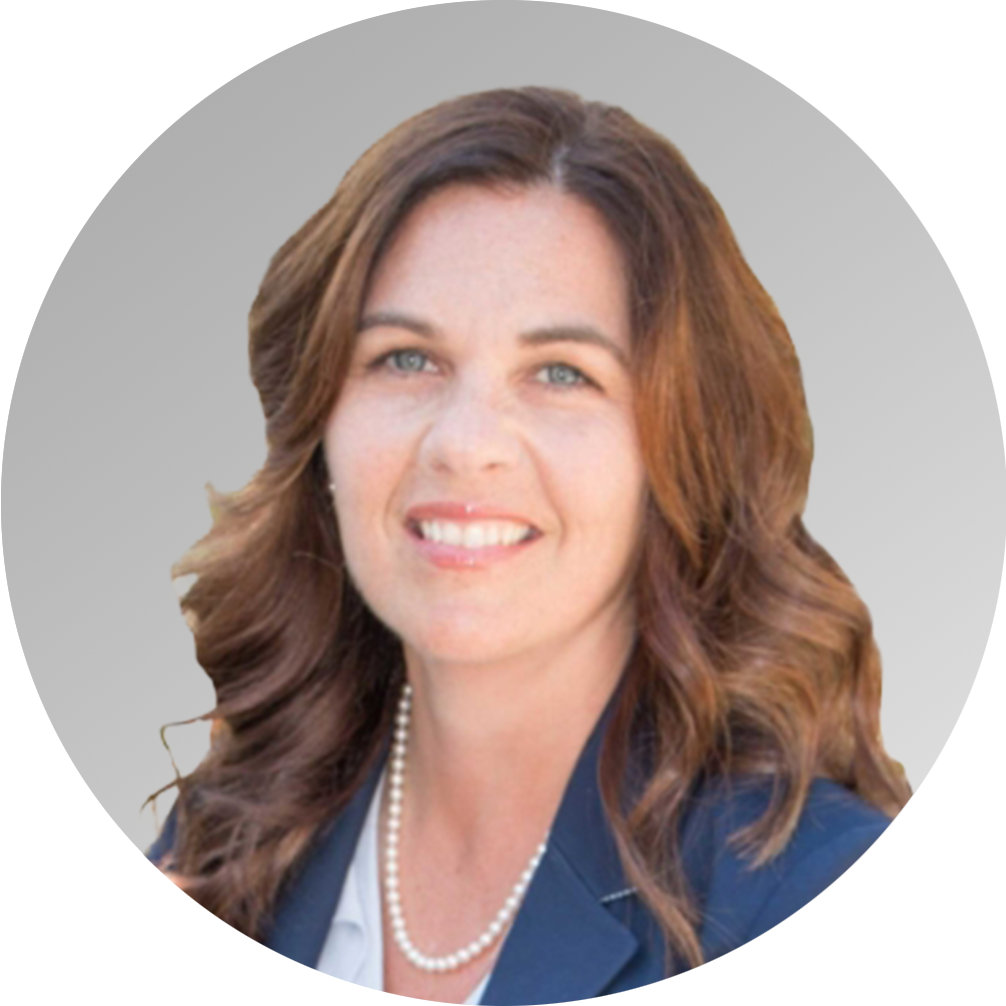
Executive Director Matt Navo started off his article with the question, “What do we mean by wellness in education?” I’d like to dive into this question a little more with adding what does wellness mean and what do we mean by wellness in education for students and educators?
In 1976, Dr. Bill Hetler released the Six Dimensions of Wellness Model. The six dimensions of wellness are: Emotional, Physical, Intellectual, Occupational, Spiritual, and Social. He defines wellness as functioning optimally within your current environment. So what does this mean for students? What does this mean for educators?
Diving into wellness just a little deeper, you find that wellness involves seeing our lives from multiple sides, a holistic view, and brings about an awareness that each dimension is interconnected and contributes to a healthy or unhealthy life. How does this translate into how we are providing an education grounded in wellness? From my experience, the first step is having self-awareness of how we are showing up for ourselves, our students, and our colleagues on a daily basis. How are you as an individual and as part of a collective enhancing your wellness and creating opportunities for students to enhance their wellness?
The National Wellness Institute developed three questions to help professionals and organizations to determine how successfully they are incorporating wellness into their strategies and initiatives:
1. Does this help individuals achieve their full potential?
2. Does this recognize and address multiple dimensions of wellness?
3. Does this affirm and mobilize an individual’s unique qualities and strengths?
I encourage us all to consider these three questions when we are developing programs, strategies, and initiatives for students and for each other.
SEL: Creating Impact To Accelerate Learning
By Barb Flores, Project Director, California Collaborative for Learning Acceleration (CCLA)

The California Collaborative for Learning Acceleration (CCLA) recognizes the importance of intentional use of evidence-based practices and integrating social-emotional learning (SEL) into every child’s school experience. SEL is a core component of CCLA, empowering educators with strategies that will impact instructional decisions moving forward.
Aligned with the California Social Emotional Learning Guiding Principles and Collaborative for Academic, Social, and Emotional Learning, CCLA values building positive relationships and leveraging student’s strengths as conditions for learning. CCLA focuses on developing the whole child through a systems lens, promoting equitable and inclusive learning environments with evidence-based social, emotional, and academic practices, and engaging in a process of continuous improvement. CCLA provides asynchronous courses and in-person professional learning that embeds SEL in math, literacy, and language development.
“Engaging educators in implicit and explicit SEL practices is essential to the academic success of students,” said Dr. Mary Ann Dewan, Santa Clara County Superintendent of Schools. “This essential instructional support provided by the California Collaborative for Learning Acceleration aims to have a great impact on student learning.”
On March 11, 2023, CCLA held its first summit – Students First: Learning Forward Together. Doug Fisher presented All Learning is Social and Emotional. “Academic learning may be the explicit focus of schooling, but what teachers say, the values we express, the materials and activities we choose, and the skills we prioritize all influence how our students think, see themselves, interact with content and with others, and assert themselves in the world.” Dr. Doug Fisher’s session is available at https://sites.google.com/sccoe.org/cclearningacceleration/2023-summit.
A Two Pronged-Approach to Tackling Educator Burnout
By Hallie Fox, Head of Research at Educators Thriving & Tyler Hester, CEO and Founder of Educators Thriving


Tyler Hester spent his first year of teaching like many first year teachers – overwhelmed. Thanks to support from his colleagues, he made it through. During his subsequent years in the classroom and leading a teacher preparation program, he saw numerous early-career educators burnout and leave. He knew what so many of us know: it doesn’t need to be this way. There are predictable and preventable causes of educator burnout. We can and should be better equipping educators to thrive in the face of those predictable challenges.
As a doctoral student at Harvard, Tyler worked alongside the Boston Teachers Union to pilot a well-being program open to all members – not just new teachers. Much to his surprise, the room the union had booked was too small to accommodate the number of people interested. Since then, Educators Thriving has served educators in over 26 districts and county offices across the country with demonstrated results: statistically significant reductions in burnout and increases in well-being.
However, Tyler and our team knew that equipping individual educators wasn’t enough; we must also improve the conditions in which teachers work. Educators Thriving now offers measurement and strategic consultation to help school and district leaders improve well-being for all staff using a unique, educator-generated scale. We offer ongoing support to leaders and simultaneously address aspects of organizational structures or culture that detract from staff well-being. By equipping individual educators and enabling leaders to drive systematic change, we can help every educator achieve well-being and reach their full potential.
How We Show Up Matters
By Erik Swanson, Senior Advisor, CCEE

When we attend meetings, whether in-person or virtual, we tend to follow a pattern or standard of behavior that determines how we interact with our teammates. This could be greeting others enthusiastically, being reserved and waiting to be called on, identifying more strongly with someone with similar experiences, or leaning in to support a teammate in need. While all of these styles can be effective in supporting our teammates, it’s important to consider whether they are effective in supporting the system as a whole.
To understand this better, we can refer to the “Ladder of Connectedness1” graphic, which represents how our connections can either support or mute our ability to foster a generative social field. A space that can support all of our teammates and move the organization forward. The three empathic stances we can take – in-group empathy, cognitive empathy, and altruistic empathy – can definitely support our teammates. However, taking somebody’s side or their feelings and/or perspective doesn’t always allow us to remain neutral and see multiple perspectives, to see the entire system.
This is where neutral awareness comes in – the ability to remain non-judgmental and non-attached, in a state of equanimity and ultimate balance. By showing up with neutral awareness, we can influence the space to be more generative, and drive the system to better outcomes for students. This doesn’t require any extra professional development – just a different way of showing up that can make a big difference. So, try it out and see what you notice – how we show up really does matter.
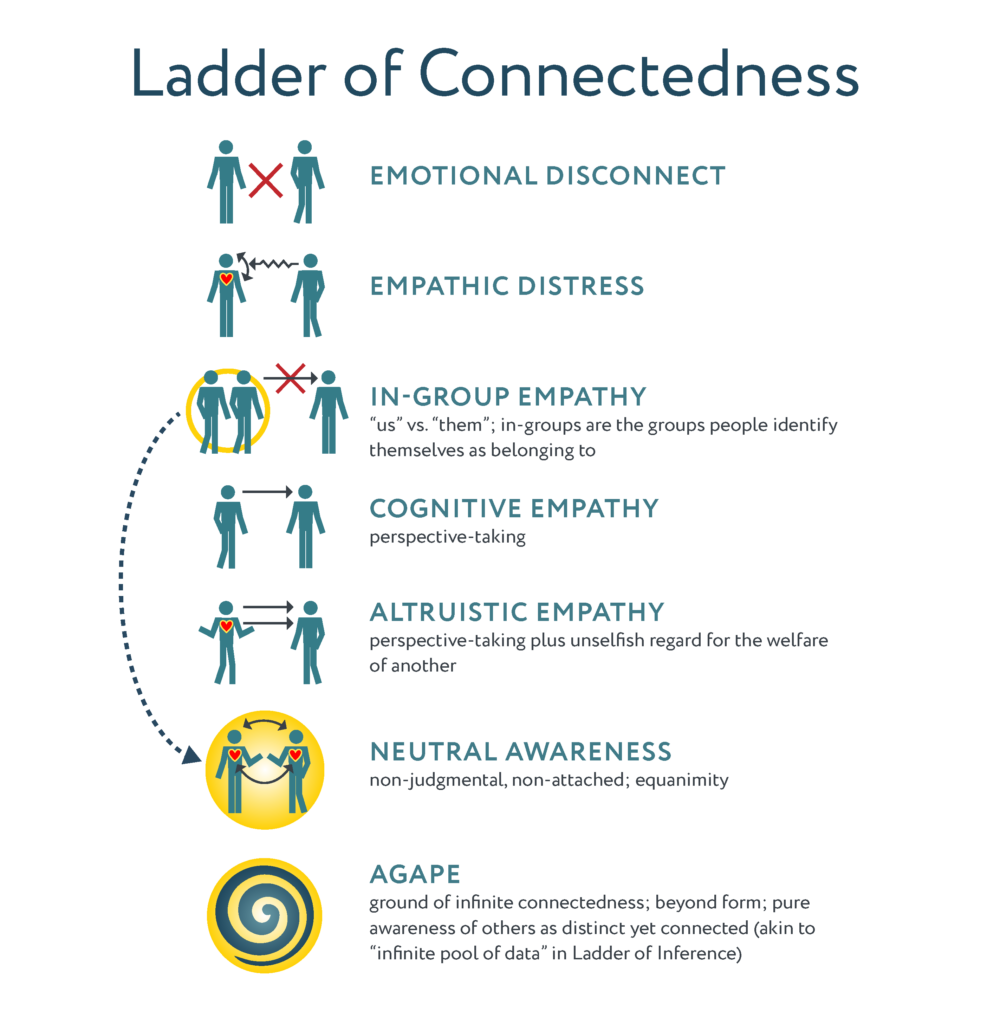
- Peter Senge & Mette Boell, Compassionate Systems Framework
